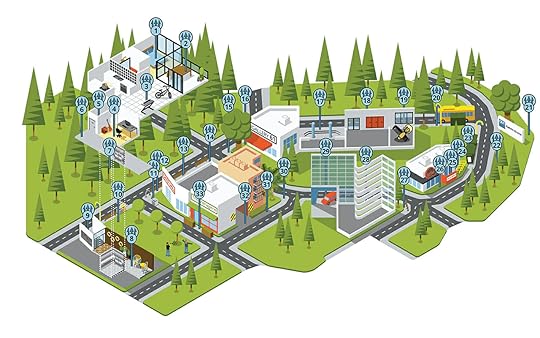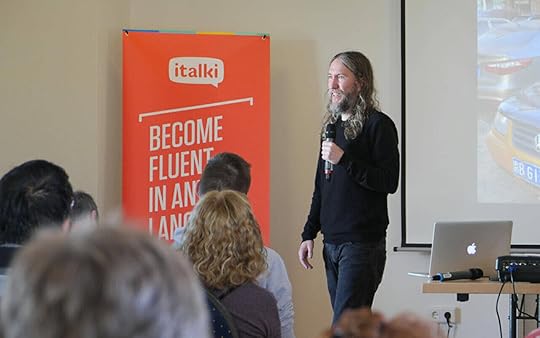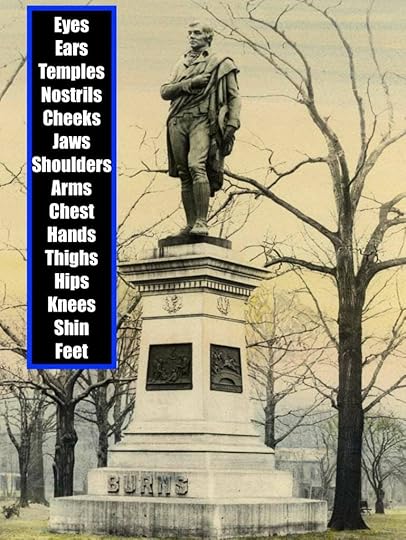Anthony Metivier's Blog, page 8
January 26, 2023
How to Memorize a Speech Fast: 5 Proven Tips for Memorizing Speeches
 Imagine this: you’re standing up in front of an audience and giving an important speech.
Imagine this: you’re standing up in front of an audience and giving an important speech.
Now tell me, how do you feel? Are your hands sweaty or your knees shaky? Is your stomach tied up in knots and feeling a bit queasy?
If you’re anything like me during my undergraduate years, maybe you even have a phobia of public speaking.
Yes, it’s true.
I might be a TEDx speaker now who gives presentations from memory around the world, but I once had a terrible aversion to giving speeches.
I was in the situation because I took a medication for manic-depression that made me shake really, really badly.
Then, in a fourth-year course on Romantic-era poetry, I was supposed to give a speech. My hands shook, my papers rattled in my hands, and I couldn’t concentrate on my delivery of the speech… much less expressing my familiarity with the topic at hand!
Instead, I left the classroom frustrated and embarrassed. It was one of the most horrible moments of my scholarly career to be shaking so badly and yet have so much to say.
Yours Free: A Private Course With Cheat Sheets For Becoming A Memory Master, Starting From Scratch.>>> Click Here For This Special Free Offer.
https://www.youtube.com/watch?v=gBvKF...
And to top it all off, the professor wouldn’t take me at my word — I had to go to the Behavioural Sciences Building to get a letter from the psychologist.
Going through this elaborate process to prove my medical condition so I could get an alternate assignment instead of being required to give the speech, led a crippling phobia of giving speeches that lasted for quite some time.
But here’s the good news: even if you have a fear of public speaking – most people do – there’s still hope. With the help of memory and a few other tricks I’ll teach you today, you can overcome your fear.
Why should you trust me? Well… here I am giving a TEDx presentation from memory. No slides, no nothing. Just raw memory:
https://www.youtube.com/watch?v=kvtYj...
Was I nervous? Not at all, even though I used to suffer like crazy just at the thought of giving a talk (even ones where I was allowed to have notes).
And I’ll let you in on a secret. Now, when I give a speech I really have a lot of fun! I think you can see that from the example above.
So are you ready to kick your fear of public speaking to the curb and have fun with it instead? Let’s dive right in and take a look at how to memorize a speech — and how memorizing can help you overcome your public speaking fears.
Want to skip ahead to a particular section?
Memorizing a Speech Without Losing Your Place
How to Memorize a Speech: Tips and Techniques for Public Speaking
Tip Number 1: Be Prepared
Tip Number 2: Relax, Relax, Relax
Tip Number 3: Don’t Make it a Big Deal
Tip Number 4: Know Your Body
Tip Number 5: Do Table Reads
The Best Way to Memorize a Speech: Create a Memory Palace
How to Memorize a Speech: Step by Step
Real-Life Examples of How to Remember a Speech
Have Fun Memorizing a Speech
You might be thinking… “but will your approach work for me?”
I can honestly say — yes! I’ve seen this method work not only for me, but also for clients of mine. Here’s one example:
Michael DeLeon wrote the other day and said:
“I’ve been training myself in the techniques of the Magnetic Memory Method. I’ve given two speeches that were, by far, the easiest for me to give because of the Magnetic Memory Method. I felt no pressure. I could relax and deliver the speech I wanted to give because there was never a fear of ‘I would lose my place.'”
So are you ready to learn some tips for memorizing a speech? Let’s start with a common fear: losing your place.
Memorizing a Speech Without Losing Your PlaceWhen we talk about how to memorize a speech, one of the first things people often ask is what to do when you get lost. In this post, we’ll cover how to find your way quickly back, as well as a host of other issues that can arise during your speech.
We’ll also talk about Steal the Show: From Speeches, to Job Interviews, to Deal-Closing Pitches, How to Guarantee a Standing Ovation for all the Performances in Your Life, a great book by Michael Port that I’ve learned a lot from, as well as some tips I learned from my mentor about giving speeches.

The short answer is: a Memory Palace can help you be fearless, focused, and able to track back if you ever do lose your place. The longer answer? Keep reading!
To make the most of this post, take notes as you read, then start to carve a path forward to where you go out and give some kind of speech (even if it’s just to your friends and family).
We’ve got an action-packed post waiting for you, so let’s get started.
Before we talk through my top tips, let’s get one big question out of the way: what’s the point of learning to give (and memorize) a speech? Whether or not you’re using a memory technique, why do you want to learn how to do it?
Here are a few benefits to being a great public speaker:
It’s a highly marketable skill.There are lots of companies that need someone to be able to present the value they offer – their expertise, unique selling proposition, value for the market, etc – and why customers should pick them. It’s the same for you — you want to be known as the person a company wants to hire, the one they want to promote, the one they want to give a raise.
Public speaking displays your expertise.Your ability to speak coherently and clearly is a key indicator to both your employer and clients that you know your stuff. When you can speak from the top of your mind without hemming and hawing or stuttering, it lets your knowledge shine.
Stepping on stage develops courage.Getting comfortable with public speaking takes practice — and getting out there and starting to give speeches (even if it’s just to a friend or two at first) will begin to build your courage muscle. It’s a win-win.
Speaking shows your personality.As you practice giving speeches, you’ll begin to develop your own personal presentation style. And the more comfortable you get, the more your personality will shine.

Getting out into the community allows you to connect with people in both your personal and business networks. And if you’re still in school, it can help you build connections with your teachers and your fellow students.
Public speaking sets you up as an expert in your field.When you’re the one up on stage, it’s clear to the audience that you know what you’re talking about. You can prepare the road ahead by being known as the expert who has the courage to get up on stage and share their knowledge. Just look at Sunil Khatri’s speech success story.
It helps you deliver results to other people.Right now, your audience doesn’t have a particular set of knowledge. When you get up on stage, you’re able to give them that knowledge — and package it in a way that helps them quickly absorb it. Plus, you can do so in a way that encourages them to take action, because they’ve seen you demonstrate how valuable it is from the stage.
Speaking can help you build your memory as you learn.Learning to memorize a speech will help you build your memory as you go. Even if you do need notes in the beginning, you can still improve your memory as you practice your speech.
Bonus: it’s fun!It’s not only a valuable skill, but being able to jump up on stage and speak off the top of your mind is actually a lot of fun!
Now you know the benefits of memorizing a speech, let’s take a look at a few tips to help you along the way.
The number one best technique of all is to be prepared.
This means: do your research and have the knowledge in your head that you’re presenting on. This might be obvious, but a lot of people think they can skip this step.

If you’re nervous or worried, that sense of fear often comes from the fact that you don’t know your topic well enough. At the end of the day, be prepared with solid research and actual knowledge about your subject…
Because the number one memory tool you have — is to not have to use memory techniques.
You’re here to memorize a speech, but the best way to do that is to know what you’re talking about. It will help you avoid your fears about getting lost when you know your subject backwards and forwards.
This is especially important if you’re wondering how to memorize a long speech.
Part of giving good speeches of any length from memory is preparation. The longer it is, the more familiarity with the core content you want to have on hand.
Then, as you prepare, memorize the key information as you go along. Snap it into your larger understanding of the topic as you go along. There are a number of ways to do this:
Use a Mind Map
Mind mapping helps you prime your memory from the very beginning, by giving it structure in space.
Imagine you’re creating a mind map — you have your central image, which primes your mind to dig deep into your memory and create a mental image around the core topic, by name. You can also use a key word that’s big, bold, and centered in your attention.

This example Mind Map was created for one of my live stream presentations. I usually juggle for a few minutes before giving a speech to get my creative juices flowing.
This allows you to think in imagery and images placed in space, and also the connections you can make by having multiple key words arranged in space.
You can also turn a mind map into a Memory Palace.
Consider Content Mapping
If you decide to memorize your speech verbatim, this is another kind of mapping that can help you with your beats.
But what do we mean by beats? When you memorize verbatim, you may want to remember things like:
Where your pauses are,Where on the stage you plan to turn and look at a particular part of the audience,When you want to pull a prop from your pocket, orAny other physical cues.You might even plan to give a speech with another person and need to remember where their lines begin.
Hat tip to Steal the Show by Michael Port for this idea.
Read Additional Books
Once you create your original mind map, then you might consider reading two or three additional books on the topic.

For example, I recently did a livestream on the topic of how to memorize a speech.
As part of my preparation, I read not only Michael Port’s Steal the Show, but also the Rhetorica ad Herennium and other books on rhetoric and speaking by authors like Matthew Clark and Dan Kennedy.
Yours Free: A Private Course With Cheat Sheets For Becoming A Memory Master, Starting From Scratch.>>> Click Here For This Special Free Offer.
Know Your Audience
One fun way to engage with your audience is to know and mention the names of your host and audience. When I give talks on , I make it a point to memorize every name in the room — and then I address audience members by name as I give my speech.
But even more important is to tailor your presentation and speech to that particular audience. This may mean memorizing things about the audience, or things about the individuals who will be present, so you can respond on the fly.
You won’t initially have the kind of information you need to do this, but it’s easy to find. Reach out to the person who invited you to give the speech – or ask your teacher or professor – and ask them what considerations they would like included in your speech.
It’s very powerful to tailor your speech to the audience and their specific interests or concerns.
Train Under Pressure
One of the best tips on how to memorize a speech I can give is this:
When you’re in the middle of a speech, you ideally want to keep moving forward — even if you make mistakes or something unexpected happens.
When you memorize your speech and train yourself to give it under any circumstances, it can help you find your place when the unexpected happens. You can then quickly find where you were and keep moving forward.
Now that you’re prepared, it’s time to let your hard work pay off.
The most important step of all is relaxation, and being willing to let go of your expectations.
Letting go of the outcome is essential when it comes to learn how to memorize a speech fast.

Why is this point so important?
For one simple reason:
When the light goes green and you’re live you can no longer control the outcome — but you can practice not being in control very early on. You do this through relaxation.
For best results, practice relaxing while you:
Prepare your research,Memorize your speech,Practice reciting what you’re going to say from memory,Deliver your speech (by being relaxed ahead of time), andAnalyze how the speech went.The more relaxed you are during each of these stages, the more you’ll be able to effectively analyze how your speaking engagement went. This gives you the chance to think through the results in a clinical fashion and improve, rather than judging yourself on your performance.
But how do you relax at each stage of preparation and memorization? There are a few techniques you can use.
Box Breathing
This is a breathing technique that’s widely attributed to a former Navy SEAL, who used the skill set to stay calm in combat situations.
To use this technique, think of a square and follow along with your breath.
Inhale to a count of five, Hold the breath in for a count of five, Exhale to a count of five,Hold the breath out for a count of five, and thenRepeat as necessary.This technique is really good for activating your parasympathetic nervous system and giving you some space between you and your monkey mind. The more you’re able to relax, the more you can be present to what’s happening — instead of overthinking.
You might wonder: why does the monkey mind go on and on?
Well, it’s worried what people are going to think about you! It’s worried about what happens if you make a mistake. It’s worried about what happens if people think you’re going to make a mistake.
Prepare to Make Mistakes
So here’s the deal… I guarantee you’re going to make some kind of mistake. I did when delivering my TEDx, largely because people laughed at a moment when I wasn’t expecting that they would.
But — it’s not really a mistake if you don’t pay attention to whatever “error” arises. If you’re relaxed and you just move on, the audience is less likely to notice that you made a mistake. If you get flustered, on the other hand, you make it harder for yourself to find your place again.
Everyone stumbles over their tongue every once in a while, and the more you speak the more it will happen to you. The way you overcome mistakes is to be relaxed and just keep going.
Remember: it’s all about practice.
Meditate
I highly recommend meditation for anyone preparing to give a speech.
It really gives you distance between what’s going on, and quiets the monkey mind so you don’t get caught up in mental commentary as you’re speaking. It allows you to roll with the punches when the punches come.
Meditation is great to help you be aware of different self-criticism that may come up and to keep going anyway. It also helps you let go of the outcome, because you can’t control what’s going to happen.
Technical situations that are out of your control? Venue issues that impede your flow? No problem — meditation helps you keep going.
Meditation also helps with the next tip on our list.
Whatever you do, don’t turn memorization into some sort of Holy Grail.

As I learned from my speaking mentor (who coached me through getting better on camera), there’s more to giving a speech than just reciting from memory.
He told me:
“Yeah, you can memorize this stuff, but it looks like you’re reciting from your mind. Nobody wants to watch this. Very few people are going to be impressed by being bored by your precision recall. It’s just not something that is entertaining or engaging.“
And when I did my first university lectures, using hundreds and hundreds and hundreds of pages of lecture notes, I quickly understood that it was much more in the service of my students to deliver from memory and select words than to be reading out these long speeches.
Soon, I abandoned my notes and spoke very freely — which made for much more interesting lectures and served my students better in the end.
It’s a process of practicing, refining, analyzing what you’re doing, getting feedback, and trying again.
And through this process of repetition, you begin to realize that giving a speech is neither the end of the world, nor the most important thing you’ll ever do. It’s simply a means to an end and can be a fun experience.
Another tip to help make your speaking experience pleasant is to “know thyself.”
Your body is like any other machine: it needs to be properly maintained and cared for to achieve peak performance.
When it comes to preparing to give a speech, it’s beneficial to be hydrated and well-rested the day before your speaking engagement.
Some people might choose to fast the day before a speech to give them mental clarity, while others wouldn’t dream of fasting because it makes them weak.
Along those lines, observe how your dietary choices affect your body. If you eat or drink the wrong thing before giving a speech, it can be very draining, since your body is processing stuff that takes energy away from your mind or makes you feel terrible. This takes focus away from the task at hand.
(For more focus tips, I suggest Nir Eyal’s Indistractable.)
Avoid any foods that make you dull, tired, or irritated. Instead, choose foods that help you stay calm and clear. Pick your battles, and know how certain foods make you feel as you choose your pre-speech diet.
Finally, let’s look at a tip the pros use when preparing to memorize a speech.
There are a few ways you can approach a table read, but the most important elements are to read out loud whatever it is you’re going to deliver — and do it seated with others so you can really study your body in a seated position.

Practice giving a speech in front of friends before taking it to the stage.
Then, be sure to also practice it standing and mobile, like you will be when you deliver the speech, with an audience present.
You do this because your writing is very different than it sounds read out loud. Because of this, delivering your speech can be very strange if you haven’t written it specifically as a speech. The table read helps you correct what you’ve written so it sounds natural while you’re speaking out loud.
And if you can’t find other people to do a table read with you… do one by yourself!
You can practice on camera — this is a great way to hear your speech externally and objectively. If you work from key words or acronyms instead of a written script, you can also get the recording transcribed.
When I prepare for a speech, I almost always record my preparation and get it transcribed. Then, I can look at 1) how it reads, 2) what it sounds like, and 3) what to add or take away.
Recording yourself doesn’t need to be complicated. You can use your smartphone to record, and use a service like Rev.com to transcribe.
If you can, share your script or transcription with other people. Ask them what’s too much, and if there’s anything you should take away. You don’t have to take their opinion, but it can be helpful to get an outside viewpoint or two.
And, be sure to ask qualified people who will tell you the truth — and that their truth is coming from a place of expertise and proper context.
The Best Way to Memorize a SpeechIf I’m totally honest, the best way to memorize a speech is – hands down – to use a Memory Palace.

Yes, I also recommend using Memory Palaces for most memorization — but I do that because they work!
Let’s take a look at why creating a Memory Palace is best, and how to do it.
Top Technique to Help You Memorize a Speech: Create a Memory PalaceThe memory palace is king when it comes to memorizing a speech.
Why? Because it enables you to use space in the world to memorize exactly what you want to deliver… in the order you want to deliver it. As you move through your Memory Palace, you’re just ticking off boxes, spatially speaking.
You know when you’ve finished a specific section of your speech, and you know exactly where you are in space. This is why it’s easier to find your place if you momentarily get lost.
Let’s look at a specific example of how a real person uses this technique: Jonathan Levi and his TED Talk “What if Schools Taught us How to Learn?“
The Memory Palace Jonathan used in this speech is one I helped him create. In this TED Talk, he shared not only that he was using a Memory Palace, but you can also see it up on the screen during his talk:

Jonathan Levi’s Memory Palace for his TEDx, a speech he memorized verbatim.
You can see how much he had to cover in his speech, and how the Memory Palace was helpful as he mentally walked through it while giving the talk.
Now you’ve seen a Memory Palace in action during a speech, let’s take a look at what kinds of things you might choose to memorize.
Yours Free: A Private Course With Cheat Sheets For Becoming A Memory Master, Starting From Scratch.>>> Click Here For This Special Free Offer.What to Memorize Using Your Mind Palace
While this technique can be used to memorize a speech verbatim, I don’t recommend it. In my opinion, it’s not the best way to give a speech, because reciting from memory often ends up sounding… well, like you’re reciting from memory.
Instead, memorize the following key pieces of your speech.
1. Key Words and Acronyms
Instead of memorizing verbatim and sounding like you’re reciting from memory, try to memorize key words and phrases out of your speech.
When you prepare in this way, you can use your Memory Palace to memorize specific words or acronyms that will allow you to unlock your speech as you go. You can also use it for data you don’t want to look at from your slides.
2. Specific Details
Your Memory Palace is a great place to store things like names, dates, and specific terminology.
It’s much more interesting for your audience to watch you look at them and pull dates out of your head, rather than needing to look at the PowerPoint or your notes. Instead, you can easily remember the names of people you’re referring to, any dates associated with them, and other details you need to keep in your head.
3. Quotes
Instead of getting your little laser pointer out and reading a quote, being able to recite it from memory is also very powerful!
Next, let’s look at a couple of tips to make memorizing with a Memory Palace easier.
Tips for Memorizing a SpeechHere’s something to consider: you don’t want to visit your Memory Palace and just recite what you find there.
Instead, you want to have access to those facts, names, dates, terminology, and quotes — and then you want to be able to recite from memory. Similarly, you want to deliver your speech with the assistance of your Memory Palace, rather than drawing your words straight out of the stations in your mind.
Memory Palaces are best used to get information into your long-term memory. This means you don’t need them to deliver the speech, but they are there as a safety net in case you need to retrieve them.
One last reminder before we dive into the step-by-step of how to remember a speech: think about why you want to memorize it.
Why You Shouldn’t Memorize a SpeechIt may seem paradoxical… here I am writing a post about how to memorize a speech, and I’m telling you NOT to memorize your speech. What gives?

Truthfully, I never actually memorize speeches, because the delivery sounds very stilted.
Quoting is one thing (and it’s sometimes nice to be able to quote things), but it’s not that interesting to listen to a fully-memorized speech.
When I give a speech, I structure it very differently, using the process we’re talking about today.
I have some key words to talk about.I have acronyms built into place to guide my delivery, and thenI practice a couple of times in front of the camera.Ideally, when you give your speech, you’re just speaking very loosely, openly, and warmly. This way, it sounds like you’re talking from one person to another.
Framing how you use memorized material can be helpful as well, so people know memorized material is headed their way — and you can be fluid in your presentation style.
Now that you have some history under your belt – and considerations around how you’ll use the material you’re getting ready to memorize – let’s take the memorization process one step at a time.
Now that you know all of the parts and pieces that go into the process, let’s break things down one step at a time.
1. Get PreparedIf I’ve said it once, I’ve said it a thousand times: preparation is everything.
While you prepare and write out your speech, start memorizing information as you go. I would recommend using a mind map during this stage, so you can start with a solid grasp of your spatial orientation.
This early stage will give you a suggestion of how to organize things later, when you’re putting it all into your Memory Palace. You might even think of the mind map as a first draft of your Memory Palace.
In particular, start to memorize any key words, facts, dates, names, or quotes you want to bring in.
Next, you’ll begin to actually write out what you want to say.
2. Write Your SpeechRemember, even though I write out my speeches, I very rarely deliver anything verbatim.

My mentor once told me, “You can memorize verbatim, but you look like you’re accessing from memory. Be more free.” The way I took his advice was to write the speech and then organize it into key words and acronyms.
Using a mind map in this step is really helpful — but even without it, organizing your speech into acronyms is very powerful.
Next, you’ll begin to memorize those pieces.
3. Memorize Your Key WordsYou’ll take the key words and acronyms from your speech and start to memorize them at the stations in your Memory Palace.
If you don’t know how to create a Memory Palace, you can pick up your free memory kit.
Or, at least make sure you’re using the masterclass – if you have it – to deeply understand what to do with your Memory Palaces.
Then, you’ll use repetition.
4. Use the “Big Five”Once you’ve memorized your key words and acronyms, then it’s time to use the Big Five at least five times.
What does that mean?
Write out what you’ve memorized, from memory.Speak it out loud, either to yourself or someone else.Record yourself speaking and then listen to the recording.Get your recording transcribed and read it over.And practice, practice, practice!Finally, you’ll practice some more.
5. PracticeThis may feel like I’m overstating, but the importance of practicing your speech is paramount!
Practice your speech in front of the camera or in front of friends. Use the relaxation tips I shared earlier in the post. And get as comfortable as you possibly can before you jump up on that stage.
Finally, let’s take a look at a couple of real-life examples, so you can see how this methodology works in practice.
In this section, we’ll talk about how to memorize a speech quickly, the way I do it.

There are a couple of speeches I give regularly. Both the NAME and FREE speech are very fluid and packaged, and I do them entirely from memory (from acronyms).
Let’s look at both speeches, starting with…
The NAME SpeechWhen I give this speech, I talk about how to memorize names.
I follow the acronym “NAME.”
Noticing,Making Associations,Using Memory Palaces, andManaging Expectations.Within 20 minutes I’m done and everyone in that room can memorize any name they want!
Does that mean my speech is a little bit different every time? Of course, but this method is super simple to follow, very structured, and gives me the chance to just talk about the topic.
Next, let’s look at…
The FREE SpeechThe same thing goes for this particular speech. When I give this speech, I run through the acronym:
Frequency,Relevance,Edutainment, and Engagement.What I find fun about using acronyms to memorize your speech is that you can also use them backward. Sometimes I’ll write out “FREE” on the board, and then proceed to work up from the bottom. It’s a great way to catch the audience’s attention.
Hopefully, by this point, your interest has been piqued. And maybe you even want to learn more about how to give a great speech.
Think back to how giving speeches used to make you feel.
Sweaty. Queasy. Shaking just thinking about stepping up on stage.
Now, think about how confident and powerful you can feel standing up on stage as you deliver your expertise to a rapt audience.
This second scenario isn’t just possible… it’s probable. All you have to do is follow the tips and techniques in this post, and before you know it you’ll be a cool and confident public speaker.
But maybe you’re thinking, “I don’t know how to get started — how can I give my first speech?” I would recommend to everybody, if you haven’t given a speech in your life, make an occasion to go out and give a speech, and give it in different ways.
Give a number of speeches, even if it’s just to a small audience or a close group of friends. This simple practice will help develop both your crystal and fluid intelligence – both needed for developing the skill of speaking. And try different formats: recite from a piece of paper, do partial recall from memory, speak verbatim from memory, or any way you prefer.
And whatever you do, have fun with it! Giving speeches is a great way to play a giant, satisfying brain game — as well as delivering value to others and setting yourself up as an expert in your field.
If you’re still feeling uncertain, there’s a mini-course in the Magnetic Memory Method Masterclass about memorizing speeches that goes deeper into this topic.
I suggest you start with the free course first and if you’re interested in speeches, and then dive into this part of the Masterclass after completing the core training. Sign up for the free course and make your memory magnetic.
January 25, 2023
How to Study for Finals (What No One Else Will Tell You)
 You know when to start studying for finals: As early as possible.
You know when to start studying for finals: As early as possible.
You also know that you need to take care of your sleep, diet and fitness in order to study well.
Oh, and yes, this matters too:
The advice that you need to keep organized and make the most out of your classes and review sessions makes total sense.
Still, you have a nagging feeling that there must be better study tips for finals.
Knowledge that goes deeper.
Because you’re the kind of person who wants more than just a passing grade.
You’re the kind of learner who wants to enjoy an epic career.
You want the learning skills that will help pass all the “exams” in life.
Well, I’m a Ph.D. who spent eleven years in university and a decade teaching at universities around the world.
And on this page I’m going to share with you some of the most powerful study tips out there. Some of them you’ll have never heard of before.
Once you have them, you’ll be the student with all the advantages.
You’ll be the student who aces the finals.
And you’ll be the student who enjoys an epic career in any field you want because you’re the one who finally learned how to really learn.
Ready?
Let’s dive in!
How To Study For Finals: 10 Tips That Actually WorkAs we go through this list, I’ll be sharing with you more than tips.
You’ll discover detailed examples of why and how these principles and strategies work so well. I’ll also give you scientific references and other research resources so you know that everything I’m suggesting is valid.
But here’s something really important to understand:
There is no cookie-cutter, one-size-fits-all study method.
You need to get involved in the process and tailor some of these strategies for yourself. And I’ll start with a powerful way you can do this in my first tip.
One: Clear Your Mind With This Simple ToolIt’s normal to be nervous when studying for exams. The mind kicks up all kinds of fears and we resist common sense thanks to all kinds of biases.
That’s why it’s important to always start the process of preparing for exams on the basis of mental strength, not weakness.
So to begin, start with this simple exercise:
Start a study journal“Mind dump” all of your anxieties about the exam onto paper (kind of like brainstorming)Analyze your fears and question why you have themOnce this is done, you can use the same journal to complete some of the steps discussed below.
If you prefer mindmapping, you can do that as an alternative to keeping a journal. I give a detailed example of how this exercise works on a mind map in this video.
This step works because when we have a bunch of worries on our mind, they keep arising until we deal with them. The Zeigarnik Effect describes why and how our minds become cluttered with unattended worries. And research shows that addressing those worries in a journal helps us eliminate them.
This ability is especially important when you’re dealing with boring topics, which every student does at some point in their learning career.
Two: Get The Big PictureYes, you absolutely want to get a head start when studying for finals. But even more importantly than starting early, it’s important to understand as much as possible before the semester begins.
When I was an undergrad, I used to contact the professors the day I registered in their courses. I asked them for the course syllabi so I could do three things in advance:
Enter all the assignment due dates into my calendarEnter all the exam dates into my calendarStart gathering and studying the reading list immediatelyThis process was critical for me because I worked sometimes up to three jobs when I was an undergrad. But getting this overview of the semester on a course-by-course basis will help even those who have student loans or grants and don’t have to work.
Indeed, later when I had grants of my own and didn’t need to hold so many jobs, I still used this approach.
As a result, I was always able to get my assignments done with time enough to revise them at least once. And I was also able to read beyond the assigned book list.
It takes 10-15 minutes to reach out to all of your teachers and arrange to get the syllabi in advance. If you can’t get in touch with them, contacting the department secretary also works. You can often swing by the departmental office to get an advance copy as well.
Three: Communicate Loud And ClearDo you know that most interruptions are a choice?
You choose them when you don’t communicate your priorities to others.
Once you’ve received your syllabi and blocked off the entire semester in your calendar, you can give your friends and family a copy. Let them know how seriously you’re taking your studies and ask them to avoid interrupting you. Most people will be more than happy to support you.
Likewise, you want to make sure your employer knows well in advance of times when you’ll be dealing with assignments and exams. Since they’re only human and often dealing with multiple employees and a variety of seasonal projections, the earlier you let them know your scheduling needs, the more they’ll be able to treat you flexibly.
I did this all the time during university. All of my employees appreciated it very much and I wound up getting more overtime during the summers than anyone else at one of my jobs because I communicated so well. This scheduling boon meant that during the times I worked less so I could study more I wasn’t suddenly struggling financially.
Finally, you should always communicate with your teachers. For example, I’ve had jobs where there were opportunities to work more due to seasonal shifts. If there was an assignment conflict, I let my professors know and arranged for different dates.
I’ve even arranged alternative assignments and exams with professors that enabled me to miss many classes without harming my grade at all.
Four: Read Right The First TimeThere’s a so-called “speed reading” expert named Howard Berg who proves that the Guinness World Records people have a sense of humor.
In fact, his record reads that Berg:
…has convinced a number of TV hosts that he comprehends and remembers what he scanned, perhaps not the details, but the concepts, with the details left for a later, slower reading.
When I teach people how to read faster, I skip the nonsense and teach you how to read right the first time. The method helps you avoid falling asleep while reading.
And you’ll learn all kinds of advanced ways to use flashcards, Anki and note taking.
If you want to learn the method in full, check out my blog post on memorizing textbooks. It allows you to read deeply, extract all the main points and rapidly commit them to memory.
That way, you will rarely have to go back to review a book again. Frankly, that takes too much time and simply shouldn’t be necessary.
Point being, skip the speed reading pseudoscience like subvocalization suppression and learn to read actively.
Five: Slow Down And ThinkIf you’re a slow reader, that might actually be a good thing as you’re learning how to study for finals.
That’s because too many students cram instead of using memory hacks and memory techniques. These techniques are very important because they give you more time to reflect.
Studies show that when you slow down and reflect on your current grades, future grades will improve.
Likewise, studies show you will understand difficult and confusing concepts better by reflecting on them. Physicist Richard Feynman was such an enthusiastic proponent of this study technique, they named it as a method after him.
Since then, many studies have shown that when you stop and take time to think without making it a formal study session, you’re using active recall. This process of using your mind helps you form memories quicker, memories that have lasting power that will serve you long after the finals are over.
Six: Write SummariesRemember that journal I suggested you keep?
It will help you reflect in the ways I just mentioned. And writing is also a great way to help you remember what you’ve learned faster.
Scientists know that writing summaries helps you learn and remember faster, but some think they are hard to write.
In reality, summaries can be simple. In order to get the job done quickly and experience the benefits, I used to summarize entire books on index cards.
By limiting my notes to two sides of one card, I kept my focus on the biggest and most important ideas. Or, if I’m using a journal, I summarize using a maximum of two pages.
By doing this, I made sure that I wasn’t re-writing every detail of the book. I was just getting down the big picture, and by doing so, crystalized many of the granular details as well. Often, I would jot these out on the card as well in the form of bullet points.
So when I suggest that you prepare for finals by writing summaries, I’m not talking about writing epic essays. Just a few sentences will be tremendously helpful.
Seven: Choose Study Groups CarefullyMake no mistake:
Study groups can be absolutely fantastic.
But they can also be a giant time suck.
I’ve experienced both versions, and it often takes only one apple to ruin a bunch.
So I learned to have all the members of my study groups sign an oath of commitment.
Sure, this sounds stiff and formal, but it was tremendously beneficial.
On the same document, I codified how the study groups were to run and that way everyone had the plan in mind and knew what to expect.
The best part?
Because we were all disciplined and spent our time wisely as we covered the big points and the granular ideas we were responsible for on the finals, we enjoyed our free and informal time after the study sessions much more.
Eight: Avoid Topic ExhaustionLearning fatigue is real, especially if you’re cramming.
Try interleaving instead.
Basically, this technique involves reading for a short period of time from one book and then switching to another.
You would think this would break your focus when reading, but it has been shown to boost how you’re paying attention. Switching between readings also increases diffuse thinking, an automatic process related to how implicit memory interacts with explicit memory.
What doesn’t work, however, is switching from reading to social media or watching movies. That has the opposite effect.
So I suggest you pile up a bunch of books while in the library, and rotate through them. This is what I look like when I’m interleaving to avoid topic exhaustion:
Nine: Study For Finals In Strategic LocationsThere are many excellent places to study.
To get started finding them, read my article on the best study locations and then experiment with a bunch.
You can also come up with a “relocation schedule.”
To this day, I still like to move from location to location while reading and writing. I call it “roadwork” and as Alex Pang points out in Rest, rotating locations has been the key to the successes of many smart and accomplished people.
Ten: Use Ancient Memory TechniquesLong before books existed, our ancestors needed to carry voluminous amounts of information in their minds. Many of the learning techniques they used are still helpful today.
One of the key techniques is called the Memory Palace.
It takes a bit of setup, but it’s worth it.
You basically create a map of locations in your mind and then associate information with familiar rooms using mnemonic images.
If you need help learning this powerful technique, please grab my Free Memory Improvement Kit:
You’ll rapidly master it and enjoy an encyclopaedic memory as you sit for all your finals.
When To Start Studying For FinalsAs I shared with you, I used to start studying for finals before the semester even began.
But the truth is that you ultimately have to answer that question for yourself.
The trick is to avoid making errors that cost you time and money because you have to retake exams or repeat entire semesters.
And to do that, look at your calendar as soon as possible.
Try to make the most reasonable projection and block out as much study time as possible.
Keep in mind that topic exhaustion is real and use the many techniques I shared today to compensate.
Although I’m pointing out that you’re ultimately on your own to make these decisions, you’re never alone.
For example, when you join my community, you’ll always have people to discuss study strategies with, people who look beyond the finals.
And that’s what I encourage you to do each and every day.
To avoid the biggest errors of all, look beyond your final exams and see life as a constant series of tests and quizzes.
Invest in your mind and memory a.s.a.p. And learn the foundational memory techniques I share with the world so that you are a mental master who just happens to be a learner.
That way you will study using energy-creating power, and not the power-draining “force” of cramming so many other learners choose.
So what do you say?
Are you ready to prepare for your finals starting today?
Thanks for reading and enjoy the process of becoming a lean and mean learning machine!
January 10, 2023
Focus First/Memory Second For Business and Lifestyle Success? 2x USA Memory Champ Shares His Secrets
 John Graham surprised me twice on the same day!
John Graham surprised me twice on the same day!
And if you know me, you know I’m not easily surprised.
So, what exactly made my jaw hit the floor?
First, I found out that John had won the USA Memory Championship… again.
I mean… who has the time for all that memory practice? Especially during times like these?
Then John tells me that focus is so much more useful than memory… and more lucrative too.
And to make matters even more confusing… John keeps telling people not to meditate in the morning?
Huh?
As a practitioner of meditation for decades, I really had to get to the bottom of all these incredible (and sometimes shocking) things John was saying.
And so I did in this EPIC discussion of how John really succeeds.
Not only to win memory competitions, but to experience an abundance of time freedom supported by a fantastic business.
And you’ll be surprised to discover that memory improvement training doesn’t even get second fiddle. Not when it comes to the tactics you really need.
After hearing what he has to say and giving it some consideration, I think it all makes sense.
And I think it will help you too.
So dive in for an epic discussion packed with takeaways, and…
Don’t worry!
I ask John to share some feedback on a little memory issue with mnemonic images I was having. So there are some next level memory secrets in this episode of the Magnetic Memory Method Podcast too.
https://www.youtube.com/watch?v=KxTpq...
Who Is John Graham?John Graham is an entrepreneur, memory expert, memory athlete and winner of both the 2018 and 2019 USA Memory Championship.
In case you’re not familiar with what an accomplishment that is, let me explain:
You have to accurately recall a lot of information from multiple categories of information.
These categories change from competition to competition, but often include:
Memorizing playing cardsMemorizing long strings of digits using something like the Major System, Dominic System or PAO SystemPoetryAbstract imagesThe Memory-Focus ConnectionBut as John points out in today’s episode, memory isn’t so much the core of his success. It’s the ability to focus his mind that matters.
And the tactics and strategies that explain his ability to win also support his entrepreneurial success.

2x USA Memory Champion John Graham with competition founder Tony Dottino
If you’re an entrepreneur and would like to speak with John about your own focus, check out his Optimize My Mind page where you can book a time.
Obviously, John is very serious about helping entrepreneurs, and I know you’ll respect his wish to focus on your concentration, not your memory.
Because John’s right:
There’s an enormous amount of information about memory techniques out there. So if you still haven’t nailed memory techniques so you can use them in your business, it’s focus and concentration that are at stake.
Get that nailed, and so many other things will fall in place.
I second his argument completely because the same thing has been true for me.
And it always will be:
Focus first!
January 5, 2023
Can A Person With No Sense Of Direction Stop Getting Lost? A Conversation With Christopher Kemp
 Ever found yourself turning down an unfamiliar street, only to struggle to retrace your steps?
Ever found yourself turning down an unfamiliar street, only to struggle to retrace your steps?
Why does that happen?
How about back before GPS, when you would pull over to the side of the road and struggle with a map?
If you’ve experienced situations like these, there’s hope.
That’s because there’s one author in particular who has no sense of direction to speak of. And that feature of his mind makes him the perfect science writer to explore what direction is and how we might optimize our experience of it.
Even better, in Dark and Magical Places, Christopher Kemp explores how the brain produces your sense of direction.
You’ll also learn why some of us might struggle to keep on track or lose our way in space.
We delve into some of the common mistakes people make and get into some of the “metaphysics” behind space itself.
Whether you’re a seasoned traveler or someone struggling to get around your hometown, you’ll find this discussion useful.
I highly recommend reading Dark and Magical places and hope you enjoy this interview with Christopher Kemp.
https://www.youtube.com/watch?v=zcGWE...
Dark And Magical Places Is An Excellent ReadThere are many things I love about this book.
It’s well written and researched, for one thing.
But it also takes you into highly consequential situations, some of which you’ll have experienced yourself.
And if you ever find yourself lost in a dark place where the stakes are life and death, you’ll find key strategies that will help you keep yourself alive.
But above all, I love how the author makes learning about the science of navigation and the brain incredibly fun.
More Resources On Memory, Directions & LocationsA few years ago, I shared this quick video on applying memory techniques to memorizing any address:
https://www.youtube.com/watch?v=i2shz...
The approach relies on a combination of:
The Memory Palace techniqueThe Pegword MethodEither the Major System or a 00-99 PAOIf you’d like to improve your navigation skills and enjoy stronger cognitive mapping of the world, I can’t make any big promises. But it’s well-worth experimenting with techniques like these. Ancient people used them all the time, including a really cool “magical place” skill called the Songline.
And of course, these techniques will work even better when you’ve read Dark and Magical Places.
Check it out!
December 30, 2022
7 Proven Steps to Memorize a Presentation In No Time
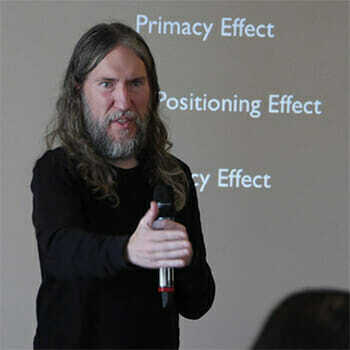 Ever since my TEDx Talk cracked several million views, people from around the world have asked me how to memorize a presentation.
Ever since my TEDx Talk cracked several million views, people from around the world have asked me how to memorize a presentation.
What qualifies me to offer tips for memorizing a speech of any length?
Well, I spent a decade as a professor at three universities in three different countries. I delivered dozens of lectures during those years.
I’ve also spent over a decade as an online “professor of memory.” My expertise in memory has taken me around the world.
In fact, in the feature image for this post, you see me discussing memory as a part of language learning at a 2016 Polyglot Conference in Berlin. You can also watch hundreds of hours of my presentations on YouTube from years of live streaming.
And on this page, I’m going to share the best of my experiences with multiple kinds of presentation.
If you want to memorize a speech verbatim, I’ll show you how.
Or, if you prefer to work from mental bullet points, I’ll help you do that too.
When it comes to memory aids for speakers, this is the real deal from someone who practices these techniques week in and week out.
Ready?
Let’s get started!
https://www.youtube.com/watch?v=5SxbH...
So You Need to Memorize a Presentation… Here’s Where to StartGetting started… this is the tricky bit.
So here’s a story using the Polyglot conference speech I gave to help dimensionalize the starting point I usually use.
Determine Who Your Presentation Is For… And Who It Isn’t ForBefore I wrote a single word, I asked myself a very simple set of questions:
Who can I help and who am I unable to help?
And what’s the one thing that will help the listeners above all?
I went through this same process with my TEDx Talk and many other presentations.
Make no mistake, this step can be tricky. It’s a discipline to whittle things down to the biggest and most important point.
https://www.youtube.com/watch?v=kvtYj...
But it is possible and often the success of the talks we enjoy most come down to knowing that the audience you’re addressing is defined as closely as possible.
It was hard for me, but I believe focusing on just one kind of person and one message for that person helped my TEDx Talk reach so many viewers.
Of course, some presentations need more details and more nuance, but even then, the principle is the same. If you think about who each principle is for and how to focus on the biggest and most impactful part, it’s going to be easier to digest. And easier for you to remember successfully.
Script The PresentationWhen it comes to helping yourself remember your presentation, writing is key. If you write a bunch of mush with endless long sentences, you’re setting yourself up for a struggle.
So when you’re putting the presentation together, ask yourself:
Do I want to memorize the speech verbatim?Or can I memorize keywords and let my expertise fill in the blanks while speaking?Both ways work very well. It just comes down to your goal. In the case of my TEDx Talk, I wrote the speech and memorized it verbatim.
In my Polyglot Conference talk, I prepared slides and memorized the key points, which involved speaking some Chinese based on how I’ve studied that language.
Either way, scripting or preparing slides can help you decide how you’re going to memorize the presentation.
Review The PresentationAs a final preparation step, it’s great if you can take a moment to review what you’ve prepared. Ideally, you’ll also get at least one other person to review it as well.
For my TEDx Talk, Thomas Krafft reviewed the script itself and a recording of me delivering it from memory. Before presenting the script of my live-action “Memory Detective” game attached to a memory improvement novel I wrote, I had a test audience go through the entire sequence.
Reviewing the speech, slides and related materials with others helps add an extra layer of understanding that helps with the memorization process. I highly recommend making time for review.
7 Proven Steps to Memorize a Presentation from Start to FinishAs Hanna Pishwa points out in Language and Memory, Aristotle was one of the first to intensively describe the rhetorical strategies used for persuasion in speeches.
But we can go a step further: Aristotle also closed his treatise on memory by explaining that we are moved most by people who speak from memory.

This is the first time I delivered a talk about Film Studies in German.
He says reciting from memory is impressive because the person who has memorized their speech doesn’t have to “hunt” for their ideas. They use a “process” that brings those ideas to them automatically.
How can you do that too? Just follow these steps:
One: Learn To Use The Memory Palace TechniqueSince long before Aristotle, people have been using the ancient art of memory to commit speeches to memory using Memory Palaces.
A Memory Palace is simply a mental copy of a location you know well, like you home, office, school, church or any place with walls, paths and other environment features.
This is a graphic representation of the Memory Palace I used to memorize my TEDx Talk:
It’s a neighborhood in Brisbane and the numbers represent individual stations.
I teach people who take the Magnetic Memory Method Masterclass to number their stations to help them rapidly create these simple journeys.
To do this, it’s helpful to draw your Memory Palaces first. Like this:

A Memory Palace drawn on an index card to maximize its value as a mnemonic device. This one is based on a bookstore in Zamalek, a part of Cairo.
Two: Add Interesting Associations To The Words & Ideas In Your PresentationThe best memory techniques all rely on mnemonic imagery.
When it comes to how to memorize lines for a presentation, you can do this very quickly by tapping into a pegword list.
For example, in a speech that starts with, “How would you like…?” my pegword list suggests Howie Mandel for “how” and Elijah Wood for “would.”
Those figures are laid out in the Memory Palace at the beginning of its journey.
This leads us to the next step.
Three: Make Your Associations ZanyLet me make a preemptive strike here:
A lot of people have protested to me over the years:
I’m not creative. I can’t get myself to see Howie Mandel and Elijah Wood to kick a like button on a platform like YouTube.
Stop right there.
I’m not creative either.
All I’m doing is taking too people who already exist and having them do something strange. There are only so many actions in the world. They could kiss the like button, put it in a rocket ship and send it to the moon, or bury it with thumbs-up shaped shovels.
Seriously. There’s nothing “creative” about this. It’s just borrowing from real possible actions and animating them in the Memory Palace. Please don’t overthink this process and make sure of the exercises I’m going to share with you in step four.
If you’re memorizing your presentation verbatim, you’ll need more associations than you would for a speech delivered based on bullet-points.
Either way, the process is the same.
Four: Make Your Associations MultisensoryOnce you’ve decided what your characters are going to do with one another, add some multisensory elements. For example, you can hear the voices of your celebrity associations, or imagine that you’re feeling them interacting with the like button in our example.
We do this because scientific research makes it clear that elaboration helps form memories faster.
To get better at making your associations weird and multisensory within seconds, these elaborative encoding exercises will help, as will these visualization exercises.
Five: Use The Memory Palace To Memorize Your SpeechWhen the ancient Romans delivered their speeches, they often would start a persuasive passage with a set of points.
“In the first place,” an orator would say before diving into the point. Then the orator would say, “In the second place,” etc.
Anthony Metivier memorizing and recalling names at a memory demonstration in Brisbane
This convention in speeches remains with us today, and those orators were literally using their Memory Palaces in real time to recall their points.
But you can be sure that they had practiced in private before delivering them. We know that Rhetorica Ad Herennium, originally attributed to Cicero, gives many suggestions around how best to practice for both public speaking and reciting poetry.
And you need to practice as well.
You do it by starting at the “first place” of the Memory Palace and then triggering those images to help you recall the words.
Personally, I practice my speeches by following several patterns. For example, instead of always starting at the beginning, I will practice reciting a few lines from the end, then switch to the beginning, then go to a spot in the middle.
This is helpful in ushering the speech into long term memory quickly because it harnesses the primacy effect, recency effect and serial-positioning effect.
Six: Practice Delivering The SpeechNow, this point is a subtly that I personally find important.
I do not go through my Memory Palace while delivering my presentations unless I absolutely have to do so.
See, when you follow the process I’ve described above, the presentation will be in your long term memory.
However, unexpected things can happen. During my TEDx Talk, people laughed at a spot I hadn’t placed a joke. It surprised me for a second and I briefly popped into the Memory Palace I’d made to help me get back on track (instead of standing there like a deer caught in headlights).
But ideally, you want to just have the speech memorized and not have to rely on any mnemonic strategies while in the moment. With optimal setup and execution, the memory techniques will have already done their job and you can do what Aristotle described: speak without looking like you’re hunting for the ideas.
And that means you can connect with that audience you identified during the preparation stage. The more you connect with them, the more successful you’ll be during and after your presentation because people remember connection.
Seven: Analyze Your PerformanceWant to be a pro speaker?
Then you’ll want to spend some time reflecting on your presentation.
This step is important because it gives you the opportunity to identify areas to improve the next time.
And it will help you congratulate yourself where credit is due. Please make sure to do so. Giving a speech is a huge accomplishment and you deserve recognition merely for making it happen.
But the real gold is some objective and subjective reasoning about the entire process. It will also reveal new ideas for other presentations you might not have thought about otherwise.
In a Pinch? Here’s How to Memorize a Speech FastI know that some people don’t have time for all of the steps above.
To be clear: I do all that I can to make sure I have enough time.
But when I don’t, here’s what I do instead.
The Acronym MethodI’m often invited to speak in the community at the last minute. I literally don’t have time to mindmap more than a few ideas.
But I can take those ideas and arrange them into a keyword.
For example, when I was invited to speak at a “Masters of Marketing” event, I arranged my ideas into the acronym F.R.E.E.
Frequent messaging to a…Relevant audience…Entertains, Educates and…Engages in the direction of a responseI placed that acronym in a simple Memory Palace and talked about what each concept mean for two minutes each.
The great thing about the acronym approach is that you don’t have to practice as much, if at all. The logic of the acronym itself guides you through the parts of your presentation because you’re mentally checking them off by spelling the acronym.
Give this presentation technique a try and you will have no problem committing presentations to memory fast.
Memorize Your Speech in No Time With the Steps AboveLet’s recap:
Presentations are so much easier to remember when you’re clear about who you’re addressing and who you’re not.
Once you’ve decided on whether you’ll be speaking verbatim or working from bullet points, the Memory Palace technique is a tried and true technique with thousands of years of success stories.
To make information “stick,” you need a process of elaborating associations. A bit of prep will take you a long way if you complete the exercises I shared on this page.
Finally, it’s worth repeating that reviewing your talk in any way possible is tremendously valuable. Even if you get a last minute invite to speak, you can probably squeeze in a few minutes to record yourself on your phone and tweak a few things.
Even if you don’t have time to change anything, just seeing yourself once will give you ideas about how to make what you’re about to say in front of an audience better.
Just make sure to avoid perfectionism. Relax and if you make a mistake, just call a spade a spade and find your way back to where you got lost.
And if you want more on the memorization process so you always recover quickly when things happen during live presentations (as they inevitably will), check out my FREE Memory Improvement Kit:
So what do you say?
Are you ready to get out there and give the best presentation of your career?
Let me now if you have any questions and I’ll be happy to share with you more granular details from my long career of presenting around the world.
December 7, 2022
Short Term vs Long Term Memory: What You Need to Know
 Few things could be simpler to understand than the difference between short term and long term memory.
Few things could be simpler to understand than the difference between short term and long term memory.
Check out this simple explanation:
Short term memory holds a small amount of information, often for as little as twenty seconds. That information either enters long term memory or it doesn’t.
Long term memory holds larger blocks of information indefinitely. And unlike short term memory, long term memory seems to have an unlimited capacity.
That’s the brief answer, and let me frame it for you a slightly different way with some quick examples:
Short term memory involves a very small amount of information remembered for a short period of time. Like when you remember a passcode only for as long as you need it.
Long term memory involves much larger sets of information for longer periods of time. Knowing the names of dozens of states in your country even if you haven’t thought about them for decades is a simple example.
Of course, there’s more to long term vs short term memory, so let’s dig in and discover more.
Short Term vs Long Term Memory: An OverviewBoth short term and long term memory are about relationships in your mind.
These relationships involve the intersection between:
The major memory typesPerceptionProblem solvingEverything from pattern recognition to critical thinking emerge from those three characteristics of the mind.
Major scientists involved in short term memory research include George Miller who identified chunking and Alan Baddeley.
Endel Tulving discovered the main characteristics of long term memory, specifically episodic memory and semantic memory.
Larry Squire is also an important figure in long term memory research.
Overall, many scientists have contributed to our understanding of these two memory types. But because science is always changing, it’s best to combine a solid understanding of the history of memory science with the latest research articles.
Studies in Long Term Memory and New Research on Short-Term Memory are decent introductions on the fundamentals of these two types of memory. For the latest studies, setting up Google alerts for “memory science” has helped me keep abreast of the latest findings, along with continually talking to memory scientists on the Magnetic Memory Method Podcast.
The Differences Between Long Term and Short Term MemoryMajor short term vs long term memory differences boil down to:
Time spent with the informationThe amount of informationDuration in memoryThe mental and physical condition of the individualLet’s look at each of these in depth.
Time Spent With InformationIn short term memory formation, you will typically have only a few seconds to perceive the information.
Any time someone gives you their phone number or a passcode, your short term memory is engaged. A simple way to improve your working memory is to play games that require you to hold onto to small amounts of information for short periods of time. There are many memory games that help with this goal.
For long term memory, language learning is a key example of spending a lot of time with information. Bilingualism is known to provide many benefits because of how it exercises long term memory.
The Amount Of InformationShort term memory involves small amounts of information, typically about as long as a password or phone number.
However, memory athletes have pushed the limits. For example, three time world memory champion Alex Mullen has broken records by memorizing an entire deck of cards in under twenty seconds.

Memory athlete Alex Mullen
Long term memory involves much more information. If you’ve ever seen someone recite an entire story from memory, you’ve seen it at work. Likewise, people who memorize speeches are displaying how long term memory relates to large amounts of information.
Duration In MemorySometimes the clarity of your recall is astonishingly long. But even more surprising is when you remember selectively. In other words, you leave out certain parts only to have them suddenly flash into your mind after the fact.
For example, sometimes you tell someone a story and miss a few details. A few seconds later, you say, “Oh, I forgot to tell you this important part.”
The reason you suddenly remember those missing details has to do with context dependent memory. No one knows exactly why an entire memory doesn’t come back properly the first time, but context does trigger more of our memories once we start recalling them. It’s a way of experiencing memory durability from a different angle.
Mental And Physical ConditionSo much of what we know about memory comes not from studying healthy people. Often we learn about memory by studying the memory of people with a variety of issues.
Baddeley’s theories of amnesia, for example, reveal many interesting things about normal human memory.
As reported in Studies in Long Term Memory, he found that amnesiacs struggle in particular with new material related to verbal memory. This is because the entrance of information into long term memory suffers from more interference.
Incidents of interference possibly increases because the capacity of short-term memory is already limited in healthy individuals. No matter how mentally sharp you are, your short term memory is already easy to distract. When you get disrupted, the amount of time you spend with the information you want to remember is lessened and the quality of that time will not be as good.
This fact means that even though your long term memory seems limitless and is generally more stable and enduring, the benefit of spending time with information does not matter if you cannot get it into either your short or long term memory.
Another characteristic of long term memory we need to consider is repetition. Even the most robust information will require use in order to remain consolidated in your brain. So let’s look at the role of repetition next.
Short Term Vs Long Term Memory: The Ultimate TruthUltimately, short term memory lets you juggle small sets of information for a short period of time. You can hold a telephone number for a short while without having to repeat it over and over again.
In fact, if you use rote repetition with a phone number, you’ll probably wind up placing it in long term memory.
That’s really short term memory in a nutshell.
The problem with long term memory is that no one knows exactly how many times you have to repeat something in order to recall it over time. But we do know that we can avoid rote and repeat information in ways that are much more engaging.
For example, if you use memory techniques, you can reduce the amount of needed repetition. And the repetition you do perform will be much more interesting thanks to how the techniques work.
You can also increase your expertise by reading multiple books on a topic in depth. Simply reading more will increase the elaborative rehearsal needed for strong and enduring memories.
Using the information you’re reading will also strengthen its place in your long term information. You can do this through writing or discussing the information, which are natural forms of repetition that can be quite fun and engaging.
But the exact amount of time you need to repeat something is simply not known. We only know it goes down relative to the depth of your experience with a specific kind of information.
For this reason, learning experts never recommend cramming. They recommend legitimate memory hacks instead.
Is Working Memory Short Term Memory?In a word, no.
But even though they are distinct concepts, they are related.
Working memory is like your mental workspace – kind of like the desktop on your computer. It allows you to temporarily store and manipulate information.
Long term memory is like the folders you use to later clear up your desktop and access the information you decided to keep later on.
Ultimately, it’s easy to be confused by these different terms. But as a general rule of thumb, scientists use different terms to distinguish them. They’re not the same and these terms help us talk about the specific differences, even though they all ultimately fall under the rubric of “memory” at the end of the day.
For this reason, it doesn’t make sense to think of working memory vs short term memory. They work together.
How to Improve Your Short Term and Long Term Memory At The Same TimeThere are many ways to improve your memory.
The best ways always involve some kind of goal.
My recommendation is to learn a variety of memory techniques, including:
The Memory Palace techniqueNumber RhymesLinking and Story methodMajor SystemPAO SystemPegword methodThese are all modern variations on ancient memory techniques. They exercise your short term and long term memory at the same time for all the reasons discussed above.
You get exercise with both small amounts of information in short periods of time and larger amounts of information over extended periods.
The simplest activity is to . When I give demonstrations in the community, I get the short term exercise. When I later run into those same people, I draw upon my long term memory.
As 2018 and 2022 USA Memory Champion John Graham has shown in his TV spots, it’s easy to add numbers to any name you’ve memorized as well.
And when you use mnemonic images in the ways I teach, you’ll draw upon your autobiographical memory in ways that are personally rewarding and fun.
You can also practice memorizing future events. This will exercise your prospective memory both immediately and over time. Because numbers like the exact day and hour on a calendar are involved, you have a small set of information that needs to be recalled in the future.
This kind of exercise provides the best of all possible worlds – and you’ll be on time too.
Beyond Short Term And Long Term MemoryNow that you’ve discovered the critical differences between these two forms of memory, you might be wondering what to do next.
How about becoming a memory master yourself?
I introduced you to a few people like Alex Mullen and John Graham. You can develop memory skills just as profound.
If you’d like that, please grab my FREE Memory Improvement Kit:
It will help you remember everything on this page, and much more.
Even better, it will exercise all the levels of your memory in ways that are easy, fun, effective and efficient.
The ultimate trick to memory improvement is to treat your practice sessions like going to the gym. The more you use your muscles, the stronger they’ll get and the longer they’ll last.
I don’t know about you, but I want both my short term and long term memory skills to be strong for the rest of my life.
So what do you say?
Are you ready to dig deeper into these topics and experience incredible short and long term memory skills yourself?
November 30, 2022
What Is Verbal Memory (And Can You Improve It)?
 Verbal memory is simple to understand when you keep one thing in mind.
Verbal memory is simple to understand when you keep one thing in mind.
And when you understand this one thing, endless ways to improve your verbal working memory emerge.
Ways that are easy and fun.
So here’s the biggest and most important thing to understand before I take you into some examples of verbal memory. Then I’ll share some proven exercises to help you improve it.
Verbal memory is about learning, specifically learning tasks that involve language.
I’m talking about:
Letters of the alphabetNumbersWordsSequences of wordsSequences of numbersPasswordsThe names of symbolsDirectionsInstructionsLearning a languageWe need to be able to track, understand and act on verbal information from each of these categories.
And often we have to use our verbal memory for multiple things at the same time. For example, having someone spell a word out loud so you can pronounce it properly involves chunking a few auditory elements at the same time.
So with this big picture in mind, let me introduce you to the granular details and show some ways to improve this very important part of your memory.
What Is Verbal Memory?Verbal memory is a term scientists use to analyse and discuss how the brain receives auditory stimulus and responds to it.
Psychologists interested in this level of memory usually take echoic memory into account, another sensory type of memory.
According to Donald Kausler in the Psychology of Verbal Learning and Memory, it’s possible that the brain tags certain auditory information for “rightness” and “wrongness.”
If true, this process suggests that verbal memory has to be constantly on guard because there are many homophones like “prey” and “pray” that don’t sound different at all. Yet something about our brain understands the difference, and if we are reading and find a typo with words like these, it is likely because the auditory part of our memory has fired off a “wrongness” tag.
Interesting, isn’t it?
Testing Verbal MemoryThe first serious tests of verbal memory probably started with Hermann Ebbinghaus. He made up a list of over 2000 invented words he called “sinnlosen Silben” (senseless syllables).
Ebbinghaus memorized these words and tracked how many repetitions he needed to remember them. He also tracked their rate of decay, which lead to the discovery of the now famous forgetting curve.
Unfortunately, many software developers have misunderstood his findings and created a plethora of “spaced repetition apps” that promise to help you learn faster. Some people swear by Anki, but as Postman and Greenbloom remind us is Verbal Learning and memory, Ebbinghaus was not testing repeated exposure to information and memory. He was testing deliberate practice of memorized information using what we now call active recall.
You can literally test the difference yourself by using a variety of memory techniques, especially the ancient memory techniques that pre-date Ebbinghaus.
Beyond that, verbal memory is often tested by scientists who use Bayesian prediction models. Such testing helps scientists know more about how young people learn and comprehend compared to older people, for example.
Examples of Verbal MemoryThere are many examples of verbal memory. Each example breaks down to:
Volume (the amount of verbal information you can retain)Duration (how long you can listen and recall verbally related information)Encoding (how fast your working memory needs to place verbal information into long term memory)Decoding (how quickly you can recall verbally related information)Here are some examples of where verbal memory plays a strong role.
One: Conference InterpretingConference interpreters listen long and hard to what people are saying. They not only understand and remember what people say in real time. They also translate the information.
Conference interpreting draws on other levels of memory as well, such as explicit memory and implicit memory. Although there are differences between these two kinds of memory, in other ways they strongly relate.
Two: Translating SymbolsRemember when I told you that verbal memory involves receiving auditory stimulus and responding to it?
This isn’t always the case. Sometimes your visual memory and your iconic memory get involved too.
Have a look at this picture:
Why does your brain know how to respond by saying, “I love you too”?
Because as soon as your visual memory and iconic memory interpret the symbol, the words come to your mind. Often they are out of your mouth before you even have a chance to think about it.
Three: Obeying CommandsYou do this while operating vehicles and machinery as well. Procedural memory comes into play very quickly when you find yourself squeezing the brake on your bike as soon as you hear someone yell, “Stop!”
Four: Playing GamesRecently, the Magnetic Memory Method community played Memory Detective, a memory improvement game I created for people interested in learning and using memory techniques.
Although the game involved several pictures, I often asked questions and gave verbal clues.
Not only did the people playing Memory Detective have a lot of fun. They told me they also learned a lot about how mnemonic devices work.
And the best part is that science has shown playing games like this is very useful for improving verbal memory, especially in adults.
There are many other memory games that will help exercise your verbal memory, so keep an eye out for the ones that involve a lot of listening and speaking.
Five: Language LearningFew other things exercise your verbal recognition than learning a new language. This is because becoming fluent practices stimulus and response frequently.
Sure, you can get pretty far learning a language with Netflix, but realistically, you need 2-5 hours speaking practice with a native in order to truly flex your verbal memory enough to get substantial results.
Six: Pi DayHere’s one of my favorite verbal learning examples of all time.
For Pi Day, my student Marno Hermann memorized 1200 digits of pi. As a result, he established a new record in South Africa, the same country Unlimited Memory comes from.
Many people memorize numbers directly from an auditory source. Brad Zupp, Nelson Dellis, Alex Mullen and many more are memory competitors.
During these competitions, someone reads numbers out and the memory competitors memorize them. Moonwalking with Einstein was written by a journalist who reported on such competitions and wound up winning himself.
The best part is that anyone can learn these techniques and get similar results. Even if you don’t become a memory athlete, you’ll get a brain brain workout.
How to Improve Your Verbal MemoryIn a word, improving verbal memory comes down to practice.
What kinds of practice? At least these kinds:
Serial learningExtended serial learningPaired-association learningFree recall learningIn all of the verbal memory examples I gave above, we’ve already seen these practice activities at play.
But let’s look deeper at some specific activities you can do.
Memorize VocabularyYou can readily get in some serious serial learning practice by memorizing vocabulary lists.
Personally, I like to practice with a foreign language dictionary rather than a software. But there are certainly tons of programs that will pump out lists for you.
If you want to replicate the Ebbinghaus nonsense syllable activity, you can use this one from Uni Saarland in Germany where I used to teach.
Memorize And Sing LyricsIf serial learning involves memorizing a list of words, extended learning is the same thing extended to sentences.
And one of the most fun and easy ways to exercise your verbal memory in an extended way involves memorizing songs. Here’s a tutorial on how to do it, including information related to the notes themselves.
Remember: It’s extended practice because it involves both entire sentences, and entire verses.
Play Word GamesOf all the brain exercises out there, the simplest for improving verbal memory involve word pairs.
Get a friend and just start listing out words, asking them to supply either the opposite or whatever comes to mind.
So if someone says “sky,” the other person says “earth.” Or if you say, “banana,” your partner can pair with the category. In this case, that would be “fruit.”
Not only will this game exercise your verbal memory, it’s also silly and fun.
List GamesFree-recall involves listing out as many things as you can with no specific order.
For example, you can list out all the states in the USA that start with the letter A. The order doesn’t matter, just that you name as many as you can.
It’s actually more challenging than it seems, even if you already know how to memorize the States.
Other versions of this kind of free recall would involve naming as many composers, artists, authors and other celebrities as you can.
We use this kind of activity a lot in the world of memory improvement, so if you’d like more listing exercises, grab my free memory improvement kit:
It will help you conquer so many verbal memory and verbal learning activities.That’s because it provides you with superior memory skills. And fast.
This course also connects you to some of the cool memory techniques that involve numbers and the alphabet, like:
Number rhymesThe Major SystemPAO SystemPegwords… and more.Give A SpeechOf all the ways to improve your verbal memory, I think learning how to memorize a speech and delivering it is the best.
Not only does it give your mouth a real workout. It also gives you feedback from the audience that helps you improve your next one.
Remember:
Verbal memory is all about reception and response. What finer way to exercise it than to talk to others and hear what they have to say?
Verbal Memory MasterySo what do you say?
You now have a clear explanation of what verbal memory is, a detailed set of examples and multiple ways to improve it.
Are you ready to get out there and make the most out of this incredible aspect of your mind?
I know I sure am, and if you’re curious about my own skills in this area, check out my TEDx Talk. It gives you proof of concept, in more than one language too.
November 23, 2022
How to Avoid Falling Asleep While Reading & Fully Recall Any Book
 If you want to know how to not fall asleep while reading, here’s what you don’t need:
If you want to know how to not fall asleep while reading, here’s what you don’t need:
You don’t need another post telling you not to read in bed.
The fact of the matter is that I read in bed often. I love it and have some strategies to share that will allow you to do the same.
Without feeling guilty about it.
That said, reading in bed is not always an ideal strategy.
In reality, any time you rely on just one strategy, reading and understanding will always evade you.
To stop feeling sleepy while reading, you need to combine a small number of reading techniques.
These techniques are easy to learn and match with the specific type of reading you’re doing.
I learned to combine strategies over eleven years as a university student and ten years as a professor.
As an independent researcher I continue to read massive amounts of material to this day.
And sleepiness simply isn’t an issue.
So if you’re ready for my best reading and comprehension tactics that literally push sleepiness away on autopilot, let’s dive in.
“Why Does Reading Make Me Sleepy?” – The Surprising AnswerA lot of people think there’s something wrong with them when they fall asleep while reading.
Nothing could be further from the truth.
Let me spell this out loud and clear:
Reading is not natural.
It is a learned skill based on artificial technologies of alphabets and books created by humans.
This simple fact means…
No one is born with a brain adapted to reading books. Not only that, but what we call a “book” is not a fixed thing. It’s always changing and you can see that change in this brief history of books.
Moreover, the human eye is optimized for scanning environments and faces, not words on paper or screens. This is why we can hang out at the beach all day without eye strain, but quickly get tired while reading on the beach.
Other Reasons You Get Sleepy While ReadingOf course, there are other reasons you might get sleepy while reading. You could be:
HungoverLacking focused goalsSuffering the effects of poor diet and low fitnessStruggling with an illness, stress or painOverworking while reading due to poor vocabulary (which is easy to increase)Or it could be a mixture of these factors. I remember when I was in university I suffered depression, poor diet, chronic pain and poor fitness at the same time.
Not only would I fall into hibernations that lasted entire days during this time, but I could barely bring the pages I was looking at into visual focus. It was only until I started applying the tactics you’re about to discover that I started to see improvement.
One of the first things I needed to do, however, was to categorize the different types of reading I was doing.
Types of Reading And Their DemandsWe read for many reasons:
To pass examsPersonal learning projectProfessional researchLiesureAll of them can be pleasurable, and sometimes we read strictly for pleasure.
But as Beatrice Mikulecky points out in her books Reading Power and More Reading Power, your eyes can still get tired when reading for fun.
Her answer?
Practice reading more. The more you read, the stronger your eyes will get. And the stronger they are, the less easily they’ll grow tired.
Likewise, you can train your skills by practicing:
Skimming and scanningNon-pseudoscientific subvocalization tacticsLegitimate techniques for reading fasterIn sum, reading is a set of trained activities and we need to do it in different ways depending on the kind of book and the exact goal of our reading.
So if you keep asking, “Why do I fall asleep while reading?” you can put the mystery to rest. Reading tires your eyes out no matter how much practice you get. All the more so if you have some of the issues we just discussed.
But even if you have some of those issues (I still have chronic pain, for example), there are strategies that can keep you awake. So let me start sharing them with you now.
How to NOT Fall Asleep While Reading (And Also Actually Remember What You Read)As we go through these strategies, there’s no particular order of importance.
Each and every one is useful, and it’s up to you to explore them.
Also, always consider context. Sometimes it’s cool to use reading to help you fall asleep, for example. But generally, we want to keep Mikulecky’s larger point in mind:
Reading, even reading for pleasure, is a trained skill.
The sooner you start training yourself, the sooner you’ll find ways to keep yourself awake while reading in a way that creates excitement and energy.
These tips have helped me for a very long time and I hope they help you too.
One: Don’t Read. Hunt.As I mentioned, we are born with brains evolved to track the environment and scan faces.
So why don’t we apply those natural and inherent abilities to our reading?
Have a look at this image:
All of those books belong to a specific category.
I “hunted” for them and took them from the shelf. Not a bunch of random books, but content specific books. Then, just as if I was scanning for the most nourishing food, I plowed through these books intentionally with the mental attitude of a hunter.
This involves adopting a particular posture. Have a look at this image:
Notice how I keep my pile of books to the side, but am sitting up and looking down at just one book.
There’s really no way to fall asleep while sitting like this.
And the hunter attitude really matters. Some of the science on adapting a mental image like this has been provided by Nir Eyal, who joined us on this episode of the Magnetic Memory Method Podcast.
Two: Remove Energy Draining DistractionsSpeaking of Nir Eyal, his book is called Indistractable. It’s great, but one thing it doesn’t talk about his how draining noise and light can be.
If you want to keep your eyes sharp and fresh for reading, it sounds weird, but reducing noise can help.
Not just while you’re reading, but throughout the day.
So if you know that you have a bunch of heavy reading to do during the evening, consider wearing earplugs throughout the day if you can.
I share more powerful tips related to great study locations and give you my absolute best tip for ear plugs.
Focus also on how you can reducing other distractions. For example, I used to have quite a few dramatic relationships.
Choosing your friends and romantic partners wisely can do a lot to make sure you have the energy you need while reading.
There’s also something called misophonia, which scientists have shown can create a wide range of energy-draining emotions.
Without education on these matters, you could wind up always being tired while reading. But now you have a massive clue that will help you reduce the issue.
Three: The Pinch TechniqueIf you’re a serious learner like I am, you need to get through some heavy and daunting books.
That’s why one of my favorite focus strategies for reading is the Pinch Technique.
It’s simple.
Instead of feeling overwhelmed by so much reading, I chunk it down by physically feeling how many pages I have left to go in a particular chapter.
This works when reading in bed or anywhere.
I know it seems silly, but it helps me tremendously, especially when I cannot avoid reading while tired.
Four: Be Patient with Boring BooksWhat makes a book boring anyway?
Usually it’s one of or a combination of a few things:
It’s badly writtenYou don’t have the background prerequisites to follow the book’s message or theoretical basisYou may have vocabulary issues, which I also come across sometimes (and that’s why I’m always improving my vocabulary)In addition to vocabulary at the level of individual words, there’s also what you might call “terminological vocabulary” or nomenclature. You might also come across challenging charts and diagrams like this:
For example, one of my big learning projects right now as I prepare to write another installment in my Memory Detective series of novels is learning all about linguistics and constructed languages.
I keep coming across terms like functional load, syllable weight, and experiential liminality. Yikes!
I know what each of the words in those phrases means, but I don’t know yet much about what the phrases themselves mean.
But learning them and committing them to memory is like investing in future energy. Through pattern recognition while reading, I feel awake and alive when I see them in the future.
I believe you will too, and it really just takes a bit of patience with boring books. And a bit of patience with yourself too.
Five: Read AloudI was required to read James Joyce’s Ulysses for my first field exam in 2004. It’s one of the biggest and most boring books I’ve ever read.
It was a dark Canadian winter, my clinical depression was heavy to the point I was worried I would not survive, and I was not in good health at all.
But I was devoted to passing this first important exam in my PhD, something that was just not going to be possible without knowledge of that book and many others related to Modernism.
So to help my tired mind and body, I listened to Ulysses on cassette with the book in my hands. There was no other way because back then, YouTube wasn’t even a thing, let alone the treasure trove of audiobooks we have online now.
There were many other books where I could not find even on cassette. So I read them aloud myself and often used a micro-cassette recorder so I could listen back to key passages, especially the tricky ones.
I read tricky passages aloud to this day. It not only helps with concentration and comprehension, but it’s a sure-fire way to keep myself awake. I’m confident it will work for you too.
Six: Multisensory VisualizationNothing keeps you more engaged and awake than comprehending through multisensory visualization.
The process is easy and you can do it while in bed:
Instead of passively reading, you actively put the words into motion.
Typically, this is done by assigning mnemonic images. It’s one of the memory techniques used by our ancestors and I’m sure it helped them keep alert while reading too.
The trick is to make sure that the associations you are using are truly multisensory, which is why I recommend the exercises in the Magnetic Memory Method Masterclass.
Does this tactic require a bit of setup and practice?
Sure, but I’ve seen many people pick up the skills in a weekend or less, and you can check out their stories for yourself.
Seven: Ask QuestionsConstant questioning can certainly feel tiring, but it can also generate more energy and enthusiasm when asking philosophical questions.
Do your questions have to be philosophical as you read?
No, but I do recommend that you question just about everything. Not only will this process of questioning help keep you away.
It will also help you understand a lot more of what is going on.
Some standard questions I use include:
What else does this point connect to?Who else says something like this?If this point is correct, who benefits?What is the author missing here?Why is this point valid?What could make this point stronger?The more you question, the more unique and interesting questions will arise.
Eight: Sleep Without GuiltSometimes we should stop trying to figure how to not fall asleep while reading.
Depending on your age, you will likely remember a lot more if you get plenty of sleep after reading.
As scientists have shown, sleep helps you consolidate memories. This means that reading a bit and taking a nap can be beneficial, not just for reading, but also implicit and explicit memory functioning overall.
And it bears noting that when you’re well-rested, you’re much less likely to fall asleep.
Nine: Build a “Magnetic Index” While ReadingMany “speed reading” courses (like this one) talk about using a pointer.
Personally, I don’t and would rather train my eyes to follow a line without a pencil getting between my eyes and the page.
However, there are some key ways I use a pencil while reading.
One of them is to take quick notes. I use this technique a lot while reading in bed, where I do not keep notes using devices or even my beloved journals.
The technique also helps me stay awake, and it’s part of the “hunting” mindset we discussed before.

One way I ensure I do not fall asleep while reading is to build what I call a “Magnetic Index.”
I call my approach the “Magnetic Index” technique. It’s a clean and efficient way to keep engaged while also avoiding marking up beautiful books with all kinds of underlining and highlighting.
All you do is put the page number and some keywords related to the key ideas. Later, you can find them. This fast process helps with recalling all of the key details from any book. And it will help you brain make connections that bring up even more details you haven’t made note of.
This technique supplements but does not replace the advanced flashcard technique I share in How to Memorize a Textbook.
Ten: Abandon Boring Books with CautionPeople like Scott Young talk about abandoning books early and often.
Although I don’t disagree outright, I think it’s horrible advice in a lot of contexts.
I don’t know what kind of reader you want to be, but I want to be as thorough and complete as possible.
I do skim through books and read them out of order, but overall, I push through big and challenging books precisely because I want to be the kind of person who enjoys foundational knowledge.
That way, it’s possible to see things no one else sees and make connections no one else makes.
The question is:
How can developing stick-to-it-ness help you keep awake while reading?
The answer is simple:
Use a Memory Palace.
This technique, when used fully and completely, helps you established webs of knowledge in your mind that increase your engagement. This happens because the more you know, the more you can know.
I realize this statement sounds abstract, but you’ll experience it soon enough. And it will help you determine with a greater degree of accuracy when it makes sense to abandon books and when it doesn’t.
If you’d like to learn this technique, please grab my FREE Memory Improvement Kit:
It will help you develop this skill.
And stronger memory will automatically translate to more alertness, focused attention and understanding that is free from memory biases that hold so many learners back.
Make no mistake, we all have cognitive biases, so to rid yourself of them, I’d suggest staying up late to learn all about them soon.
Stop Falling Asleep While ReadingAs we’ve seen, the goal is a bit more nuanced than simply stopping the issue from happening.
In reality, you can read in bed, provided you set yourself up for success. I’ve got a PhD and two MAs and read in bed all the time.
I hope my tips have helped you discover not only how to keep alert while reading, but also to remember and understand more.
And I hope you now understand that feeling sleepy while reading isn’t your fault. It’s normal. And provided you structure your time and environment appropriately, it’s actually okay to fall asleep while reading.
Sleeping isn’t the issue. It’s timing, structure and a personal commitment to exploring better tactics over time.
So what do you say?
Are you ready to get out there and read with greater alertness?
November 15, 2022
Memory Bias: 5 Ways To Stop Your Mind From Deceiving You
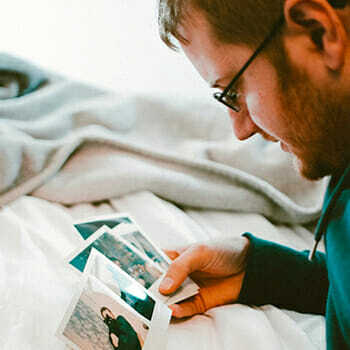 Suffering from memory bias is very common.
Suffering from memory bias is very common.
As is suffering from cognitive biases overall.
Many critical thinkers, psychologists and philosophers have pointed out that the key to living a happier life is to reduce every negative cognitive bias that you possibly can.
Is doing so a difficult mission?
Potentially.
But when you understand the variety of memory biases out there, nothing could be easier.
And on this page, I’m sharing descriptions, examples and resources that will help you reduce their impact in your life.
Can I share something weird with you before we get started, though?
Here it is:
Not all cognitive biases are bad.
Our brains simply must take shortcuts in order to survive.
Yet, we can develop an awareness of what these shortcuts are and why the brain is taking them.
With that level of “meta consciousness” established, we can lead better lives.
So if you’re ready to understand what these biases are and benefit from the useful ones while reducing the impact of the damaging memory biases, let’s dive in.
What Is A Memory Bias?Put simply, a memory bias is a mental operation that usually takes place unconsciously.
It’s like a shortcut, often called a “heuristic” by psychologists like Daniel Khaneman in landmark books like Thinking, Fast and Slow.
There are many kinds of biases, and it’s important to note that psychologists give them names by way of bringing clarity to what the human mind is and how it works. It’s like implicit and explicit memory, two terms that help us see the difference between memories we draw upon consciously and those we draw upon unconsciously.

Many memory biases are unconscious, which may be part of why we sometimes use the phrase “asleep at the wheel” to describe how people take mental shortcuts that lead to less than ideal outcomes.
And that’s important to understand. Most of our memory biases are unconscious. They’re difficult to detect as a result.
Yet, they can powerfully force you to associative negativity to neutral aspects of life.
For example, you may have heard someone say they’re a “burnt child.”
I just said this myself. Earlier today I met a marketing agent representative and she asked me if I had any hesitations about working with her agency.
“Yes,” I explained. “I have a history of working with companies and individuals that made huge promises but failed to deliver.”
My leaning toward the negative experiences shines poorly on this new company who wants my business. That’s because my memory is delivering up a bias towards being let down.
Counterintuitively, this company could be the best possible agency to help me, and I might never know if my memory bias wins and I decide to decline their offer.
On the positive side, you can think of companies you’ve used for years and would never change. That is the positive side of a memory bias, and it can keep you in good stead.
Unless this positivity bias prevents you from leaving a company because you’re stuck with previous memories of good service. Your mind could be “tricking” you into holding on longer than you should because it tells you things will get better.
So the question is:
How do we spot these biases and reduce or eliminate the bad ones from our lives? The first step is to get more familiar with what they are and how they work.
5 Types of Memory Bias You Need To MasterAs we go through this list, I’ll share with you references and examples.
If you want to learn them all and remember the details, I suggest learning how to use a Memory Palace. It’s a fun and cool way to learn faster and retain more.
Also, note that these memory biases are in no particular order of importance. In reality, they’re all important and they all influence each and every person in different ways.
Do all biases relate to memory?
I believe so. That’s because they’re all taking place in the brain which involves many types of memory, ranging from procedural memory, episodic memory, autobiographical memory, explicit memory, implicit memory, prospective memory and more.
With that in mind, let’s look at the most key biases related to memory directly. And let’s discuss how to use them well or reduce their impact.
One: Memories Are Not RecordingsA lot of my students in the Magnetic Memory Method Masterclass tell me that they want eidetic memory. This is the scientific term for what people often call photographic memory.
Therein lies the rub.

Memory is more like a process than a photograph, yet we are biased to think of our memories as picture perfect.
Memory is like neither a movie or a photograph. It’s a process that is always changing.
Dr. Gary Small likens our memory to a neighborhood filled with traffic and people moving around from house to house. Our memories literally travel around the brain over time, just as humans move around the world. And just as we change when we travel, our memories change as they move around the brain.
Yet, we have a bias towards thinking of our memories as static and unchanging. This simple is not true, expect perhaps when it comes to semantic facts, and that’s assuming we remember information about words and numbers correctly.
In reality, memories can be implanted and they transform all the time without us even knowing.
Using memory techniques frequently is a great way to help keep your facts straight, but we all need to be open to the fact that we could be wrong. And when we are, we need to use those same techniques to help us update the information.
Two: Bad Habits Don’t Necessarily FadeI’ll never forget the day I realized that I am my father’s son.
I’d been meditating for a number of years and finally gained enough to detachment to observe myself dispassionately much of the time.
I noticed that I would freak out a lot like he did. Especially when I followed in his footsteps of drinking too much, which gave me a beergut.

Extinction bias happens when you commit to quitting a habit. It can force you to return to it even stronger than before.
I’m not talking about throwing a tantrum, necessarily. It’s more about finding it very difficult to handle things not going smoothly.
Then I would commit to not being like my dad, only to find myself… being just like my dad when I failed at this commitment.
Why does this happen?
Psychologists call this phenomenon an “extinction burst.” One way of looking at it has to do with how the values of our parents rub off on us. Dr. Nick Bendit has related how this happens to us in relation to implicit memory in his research.
I personally respond a lot to his research findings because even though I’ve found great peace over the years (as reported in The Victorious Mind), trying to avoid these habits engrained deeply from birth remains incredibly tricky.
As an exercise, you can journal for self improvement outcomes to help discover where you might have habits that seem to get even stronger after you commit to removing them.
And don’t worry. As reported on Psychology Today, even if the solution to these bad habits might involve “giving in,” it doesn’t mean giving up. And you can really can improve by applying self reflection exercises and simply understanding that this memory bias exists.
In my case, it’s not all bad. Far from it.
When I explored more of my father’s character in me, I also found more inner strength to draw upon. He’s a survivor, after all, and tremendously skilled and creative person. His accomplishments are astonishing and journaling about it helped me realize that and let bygones be bygones.
Three: Recency BiasIf you’ve ever heard that some people have a memory bias toward items at the end of a list, this notion is often true.
Recency bias causes some of us to take into account more recent events. It can be so strong that the brain practically wipes out years of data, not just the details at the beginning of a list.
I have this bias quite badly myself. Often when I look at how my business is doing, my brain takes into account only the past three weeks. It’s like it erases the entire history of my work and I start to freak out.
The best solution for this one is to know what it is and feed yourself with the larger context. It will help unlock your memory from its focus on just the past few weeks. Keeping a memory journal is a key strategy that will give you rapid access to more information, something Johaness Mallow and I discussed recently on the Magnetic Memory Method Podcast.
You can also reexamine your goals. For example, if you find yourself only focusing on your most recent results on an academic exam, you may benefit by looking at the larger picture.
Once, while I was a graduate student, my dissertation supervisor told me that the job situation looked bleak. Although I was frustrated by his statement and could not deny the evidence, I looked at the big picture.
By realizing that things were indeed in decline recently, I decided not to abandon my doctoral studied. Although I no longer work as a university professor, deciding to finish was very important for my mental well-being and gave me valuable skills and credentials that have served many times since.
But had I let his recency bias influence me to quit, I would have missed out on so many positive experience.
Four: Hindsight Bias“I told you so.”
Have you ever said that to someone?
Chances are, your memory is playing tricks on you. This is because hindsight bias causes us to believe we knew something all along, when in reality, the result has distorted our memory of the bigger picture.

Hindsight bias is negative when people say “I told you so.” They often don’t realize that their memory changed their perception of reality. This bias can have positive aspects, however.
In my life, I’ve experienced this in a somewhat positive way. True, this example somewhat strokes my ego, but check it out and tell me what you think.
When I finally decided to write for a living, once I started seeing success, I had the feeling that if I had only started sooner, I would have been able to enjoy this career sooner.
Now, this feeling is probably a distortion. The more likely scenario is that I probably wasn’t mature enough to make it as a professional writer. But my hindsight bias that I was always “destined” to write for my living actually helps drive me forward and continue doing it.
Overall, however, this bias is not great. To fix hindsight bias, you can think through “counterfactuals.” This means considering how things could have been different, as I did in the example above. Scientists have validated that this approach helps avoid this bias, or at least have clarity around it.
Five: One Example Is Rarely EnoughThe availability bias is a mental shortcut, and a particularly nasty one.
You see it whenever someone tells you, “None of my friends have this problem.”
Or, you might hear about a crime in a neighborhood you want to move into. Because you’ve found one example, the availability bias digs the impression deep into your mind that this particular place is dangerous.
A major time this happened to me took place shortly before I moved to Brisbane. I read in the news that a year before we made the move, someone had set a bus driver on fire.
It’s a really hard bias to deal with because instantly my mind decided that Brisbane must be a very dangerous place.
But because I knew about this bias, I knew that this one case was no way to make such a decision. And as it turns out, Brisbane is actually great.
There’s an old story about Socrates meeting two visitors to Athens that illustrates this bias in a different way.
As the story goes, one traveler asked Socrates what Athens was like. Before answering, Socrates asked, “What’s it like where you come from?”
The traveler said, “Oh, it’s noisy, people are rude and always in a hurry.” Socrates replied: “Yes, it’s like that here too.”
When another traveler approached Socrates with a question about Athens, Socrates also asked his question before answering. In this case, the traveler said, “Where I come from, the people are friendly, help each other and do all they can to lead great lives.’
“Yes,” Socrates said, “it’s like that here too.”
Does It Matter That We All Suffer From Memory Bias?As the story with Socrates illustrates, we’re all biased and more than one thing can be true at the same time without contradiction.
But it really helps when we can become aware of these biases and reduce their negative impact in our lives. And philosophy is another important tool that can help us in addition to generally learning about these psychological quirks we all share.
Our biases can be beneficial too, such as when journaling creates self awareness and change.
And it is always good when we know what’s going on in our minds and can self-reflexively correct our behaviors.
So we all have every reason to study multiple biases, commit them to memory and work to minimize their impact in our lives, while utilizing them when they’re useful.
If you need help with the memory part, please sign up for my FREE Memory Improvement Kit:
It will help you learn all of the biases we talked about today much faster.
And when your memory starts bringing them to mind as you navigate the world, you’ll enjoy a much better life than you probably ever imagined possible.
The best part?
Your memory biases won’t distort or exaggerate a thing!
November 9, 2022
The 11 Best Places to Study (And How to Study at Each One)
 So you’re looking for a public place to study.
So you’re looking for a public place to study.
Tricky challenge, isn’t it?
I went to university for eleven years before I finally got my PhD. That means I’ve faced every issue you can imagine when it comes to discovering the best and quietest study locations.
I’ve overcome every obstacle and barrier under the sun.
And later, when I was a professor myself, my skills at focusing in a variety of places paid off big time. I still use these skills as an author to this day.
I’ll share a bit about my current study habits with you too. Because, quite frankly, I wish I’d known what I found out as a professional much earlier.
But more on those points later.
Let’s talk about finding learning locations that you can rely on. I’ll pile on some of my best learning tips as we go.
The 11 Best Places to Study (and How to Actually Study There)As we go through this list, there’s no particular order of importance.
But I’ll stress one point:
Any place you can study is the best place.
Variety is the key at the end of the day, as is training yourself to focus your mind at will.
One: The Biggest Library You Can FindLibraries aren’t necessarily quiet places to study. That’s why the bigger they are the better. You will have multiple options to choose from if the part you’re in starts getting noisy.
Multi-floor libraries are especially good, as is moving regularly. Not only can you get the scientifically proven benefits of moving around. You’ll also have a chance to practice interleaving.This process can be as simple as flipping through a few other books so that your brain absorbs the main topic with greater depth and speed.
Finally, large libraries tend to have better trained staff.
Make no mistake:
A good librarian can help you solve many problems. I’ve not only drawn upon the help of librarians around the world. I’ve worked in three libraries myself, once as an assistant for the head research librarian at York University.
Librarians are smart people and they can point out resources you’d never find on your own, which makes your research easier and much more fun.
Two: Clubs & AssociationsWhile at York University, I became the president of the English Undergraduate Student Association for one simple reason:
It came with an office. I also had access to multiple parts of the campus that regular students did not.
When you’re part of a university club or association, you may be able to do the same.
The trick is to tie these activities into the topic you’re studying as much as possible. For example, every guest I invited during my presidency was related to an area of study or assignment I was working on.
And make no mistake: When you can shift the activities of the organization you choose to participate in, you’re getting more than good places to study. You’re getting fantastic experiences for your resume and reference letters for the future.
Three: Parks With Statues & BuildingsWhenever it’s warm outside, I like to study in parks. Back in Toronto, I loved studying in the Allan Gardens because I could use one of its buildings and a statue as a Memory Palace.
It works simple:
You chart out a journey on the statue or use an ancient memory technique taught by Giordano Bruno. I did this with the Robbie Burns statue by creating 30 stations:
By selecting only the parts of the body that come in pairs, you get 30 stations in total. You can also use the pedestal if you like, but in this case I did not.
Once you have the statue mocked out with stations, you just need to apply some mnemonic imagery to each of the stations. That way, the information has a place it can stick.
The only downsides to studying in parks is that the weather can change in a flash. Traffic noise can pick up during certain times a day and you never know when a demonstration might arise.
Other than that, they are by far my favorite places to study. I still study out doors, often for weeks at a time without missing a day.
Four: Buses & TrainsSure, they can be noisy. But I used to play in bands and always had ear plugs with me.
They’re cheap and you can find them at just about any drugstore or pharmacy.
The main downside is that you have to keep an eye on the destination, but I often set a timer so I could feel my phone buzz in my pocket in good time to gather my stuff in time to depart. Or I would tell the driver that I would be wearing ear plugs and ask for a reminder. Many drivers are perfectly happy to help you out and you can sit close to them. That makes it easier for them to alert you.
Later, when I taught at Rutgers, I found myself living in Manhattan. I had to commute all the way from Washington Heights to New Brunswick in New Jersey.
I would study for my dissertation on the way in and grade student assignments on the way back. More often than not, I got all of my grading done before reaching Penn Station.

When I lived in Vancouver, the “secret garden” on top of the Vancouver Public Library was one of my favorite study places. I also use to hang out and study with my friend Jen on her rooftop to read books and discuss what we were studying.
There are all kinds of little places like these around and all you have to do is ask about them or search the Internet.
Six: Grad LoungesOne of the reasons I learned so much at university is because I hung out in the grad lounge. Back at York, it was called the Seventh Floor Grad Lounge. Now it’s on the ground floor.
Places like these are great for studying at certain times of day. You’ll often hear graduate advisors helping their students and get inspiring ideas from overhearing their meetings.
Or you’ll talk to some of the star faculty yourself. I sat with Robin Wood many times, a highly regarded film scholar during his time.
Frankly, between him and the man who eventually became my own graduate supervisor, I probably learned more talking with these guys than from all of my courses combined.
The only problem with these locations is they can get noisy in the mid-afternoon and stay noisy until late at night. Budget your time for this happening.
Seven: Cafe CircuitsJust as you want big libraries so you can move around, having a “circuit” of cafes is tremendously useful. In Toronto during my university years and later in Berlin while writing and studying German, I charted out a robust map of cafes.
Rather than study in just one, I would spend approximately forty minutes to an hour. Then I would move on to the next.
The routine gave my brain plenty of focus time and an opportunity for mind wandering. If you’re concerned that you’ll be losing time while walking between cafes, Rest, Mindwandering and Stolen Focus are three science-packed books that beg to differ.
The main thing you have to watch out for is not burning out your adrenals. Coffee can boost focus and attention, but too much of it has a negative effect.
Eight: Some BookstoresThere are so many great bookstores. But not all of them are suited for studying.

It can take some hunting, but some of them have cafes in them. Or they have open spaces with nice chairs and tables.
Used bookstores in particular can be especially useful. They have older books that you probably wouldn’t stumble across otherwise. If you know how to read faster, you’ll readily get a lot out of them.
Nine: ClosetsOkay, this is going to sound kind of weird.
But during part of my studies, I suffered bad clinical depression.
Noises used to drive me bonkers, as did too much light. “Where can I go to study?” I would fret.
Then, suddenly a memory dawned on me and I returned to something I used to love doing as a kid.
See, we had a hard curfew when I was young. So I would sneak one of my dad’s flashlights into my room. To hide the light, I would crawl into my closet and read until three a.m. or later.
I remembered this when I was struggling during university. Tossing a bunch of pillows and blankets into the closet and propping up the biggest flashlight I could find provided me with maximum comfort and focus while reading.
Ten: Study GroupsMany libraries have rooms for study groups. You just need to book them in advance.
You can often get them just for yourself, but it’s great if you can get a few people together who are focused on a similar topic.
Obviously, you’ll also need private and quiet study time. And you can get a ton more out of studying with others if you’re slightly prepped.
My favorite study group in grad school was hosted by my Hebrew tutor and reach of us read a different article in advance. Then we’d present what we’d read. This mean getting exposure to a much larger pool of knowledge than any of us could have on our own.

“Hell is other people,” as the philosopher Sartre said.
Although that’s a bit of an extreme way to look at things, let’s call a spade a spade:
One of the biggest problems learners face is getting people to keep quiet and eliminate distractions.
To do that, you sometimes have to draw upon a kind of commander-in-chief aspect of your personality.
Make it clear to people that you’re not to be disturbed and they will tend to respect your request. And realize that there is a hidden, yet massive benefit to alerting people in this way: You have to schedule your own time in order to schedule their “no interruptions” periods.
You should also block off certain spaces.
I learned a lot from my friend’s mom. She was a professor and had a simple sign on her home office door. It said, “writing.”
And when that word was facing you, no knocking or talking was allowed.
Simple, yet effective.
The Best Public Place To StudyThe absolute best public place to study is the one you:
Practice studying inGet the best results inTest and experiment with over timeThis set of conditions means that many places can be the “best.”
And my philosophy has always been to do whatever it takes to get the job done. That’s why I often moved around and continue doing so.
Even when revising my books, which is a kind of study, I will get them printed and read them in different locations. It’s so key to observing a maximum amount of details, rather than the minimum.
As I shared, ear plugs are key, but here’s one step better.
In 2012, I invested in custom ear plugs. These are the kind you can put filters in.
They’re so comfortable and you can still hear your surroundings. The noise just interferes with you less.
It takes a bit of time to get them fitted and they’re not exactly cheap. But they last for years, travel small and make it possible to study just about anywhere without any distractions.
So there you have it. My best tips for finding incredible study spots.
Why not get out there and start experimenting so you can find yours?









